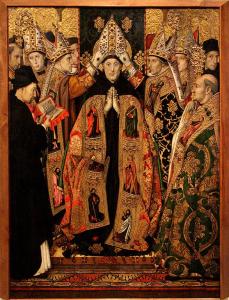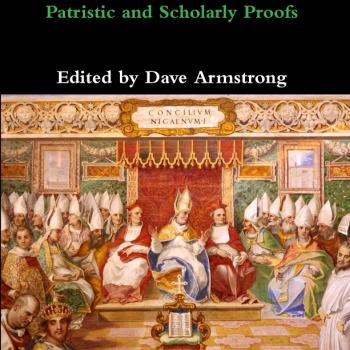Gavin Ortlund is an author, speaker, and apologist for the Christian faith, who serves as the senior pastor of First Baptist Church of Ojai in Ojai, California. Gavin has a Ph.D. from Fuller Theological Seminary in historical theology, and an M.Div from Covenant Theological Seminary. He is the author of seven books as well as numerous academic and popular articles. For a list of publications, see his CV. He runs the YouTube channel Truth Unites, which seeks to provide an irenic voice on theology, apologetics, and the Christian life.
I greatly admire and appreciate what Gavin describes as his “irenic” (or what I often call an “ecumenical”) methodology, and viewpoint. It’s extremely refreshing to hear in this age which is so hyper-polarized. He is an exemplary Christian role model of this open-minded, charitable approach. We all learn and “win” when good, constructive dialogue takes place. It’s never a “loss” to arrive at more truth or to recognize one’s own error.
*****
This is a follow-up to my article, Augustine & Sola Scriptura (vs. Gavin Ortlund) [4-28-22], which included some back-and-forth written interaction with Gavin. I will be replying to his two related videos: Response to Critics: Augustine on Scripture (11-14-21) and Response to Lofton and Little on Augustine and Scripture (11-26-21), as I promised to him yesterday. I’m not dealing with — let alone, defending — how these other apologists argued their case (that’s their burden and one has only so much time!). I haven’t even listened to them. Rather, I’m replying to Gavin’s counter-replies to them; additional arguments that go beyond his first video. See also my earlier critique: Reply to Gavin Ortlund’s “Sola Scriptura Defended” [4-27-22].
His words will be in blue; St. Augustine’s in green. I will provide minute markers along with his comments.
I’m trying to be irenic . . . which means, aiming for peace, but, I don’t think it’s contrary to irenicism, to firmly advocate for our convictions. [0:48-1:04]
I totally agree, and I, too, have always sought to jointly achieve both things in my apologetics (per 1 Peter 3:15). It’s much easier to do (believe me) when my dialogue opponent is also committed to being charitable to me, personally, and towards my position (as Gavin is, in an exceptional and impressive way).
It’s extremely difficult to carry off in attempting “dialogue” [choke!] with Protestants from the fringe anti-Catholic wing, who think that any Catholic who actually fully abides by Catholic teaching cannot be saved as such or be a Christian: with all the hostility sent our way — including downright hatred — that usually accompanies that opinion. I’ve been called by such people every name under the sun, including “evil”, “of evil character”, “psychotic”, an abuser of my wife and children, one who allows his family to go hungry, a damned soul who shouldn’t even be prayed for, every imaginable synonym of “stupid” and “ignorant”; you name it. And of course, there are extreme Catholics who treat Protestants in similar arrogant and condescending fashion. All of that is abominable and detestable, no matter who does it.
Many seem to think in Catholic circles that ecumenism is antithetical to apologetics, and amounts to a sort of relativistic doctrinal indifferentism. It’s neither thing. That’s comparing apples and oranges. Both endeavors are supremely important and a duty for Catholics (and I would say, all other Christians, too). We are to give reasons for our views and replies to contrary views and to do it with gentleness and charity. I don’t always achieve this, and hardly ever to the degree that I would like (and that God would want), but I know for sure that I always try to do so, and seek it as my high Christian goal and ideal.
Augustine doesn’t align with Protestantism in everything, but he also has many points where he doesn’t align with Roman Catholicism, or with other traditions. [6:15-6:27]
I broadly agree, but would change the word “many” to “some.” :-)
Gavin brings up again his citation of Augustine writing to Jerome. He challenged critics to find anything in context that would suggest a meaning other than sola Scriptura. I did so in my previous reply, highlighting his words shortly afterwards: “I do not suppose you to wish your books to be read like those of prophets or of apostles, concerning which it would be wrong to doubt that they are free from error.” I then went into a lengthy comment about both prophets and apostles, noting that their utterances go beyond Scripture and that both are described in Scripture as enduring in perpetuity as offices in the Church. I think this is significant because it seems to me to suggest that Augustine still has in mind (albeit maybe only remotely) extrabiblical infallible utterances.
I agree that Augustine is referring to ecumenical councils in the passages in question, in using the term “plenary.” Again, I think Gavin’s confusion is to say that “only the Scripture is infallible” [11:07-11:09]: based on what Augustine said. I think Augustine’s point is that only Scripture is always infallible, always free from error. Nothing else is in that category. The Catholic need only prove that the Church, councils, tradition, apostolic succession are sometimes infallible and irreformable. And I say that Augustine thinks that that is the case, too (based on my assortment of citations from him).
It may be considered a “fine point” or special pleading, but it’s a crucial distinction, in the way that “only infallible source” is crucial to the definition of sola Scriptura. To assert that only Scripture is always infallible, is not to contradict the Catholic rule of faith at all, because we agree. The question is whether non-scriptural entities are ever infallible authorities. We say yes, Protestants say no. I believe Augustine agrees with us in this regard. How do we know that? We know (I submit) because he used synonyms for infallibility in referring to authorities other than the Bible:
For in the belly of the Church truth abides. (E.Ps., 58:3 [58, 5] )
It is plain, the faith admits it, the Catholic Church approves it, it is truth. (Serm., 67, 6 [CXVII] )
We, namely, the catholic faith, coming from the doctrine of the apostles planted in us, received by a line of succession, to be transmitted sound to posterity—the catholic faith, I say, has, between both those parties, that is, between both errors, held the truth. (L.John, 37, 6)
. . . anything which the true faith condemns, . . . (Cat.U., 8, 12)
Note that in his letter to Jerome, he used the words “truth” and “error(-free)” too, so he is applying the same language to the Church, just as Paul in the Bible refers to “the truth” and “the faith” and “the gospel” and “sound doctrine” (1 Tim 1:10; Titus 1:9; 2:1) and “the tradition” (I would say he uses them all synonymously, as I argued in my first book in 1996). And Paul also referred to “the church of the living God, the pillar and bulwark of the truth” (1 Tim 3:15, RSV). St. Augustine in his letter to St. Jerome also used the terms “doctrine of Christ” (2, 9) and “Christian doctrine” (2, 10). Likewise, he wrote elsewhere:
[S]ound doctrine, which alone is Catholic, . . . (C.Faust. xx, 23)
[T]hey introduced into their writings certain matters which are condemned at once by the catholic and apostolic rule of faith, and by sound doctrine. (Harm.G. i, 1, 2)
He also uses the word “confirm” with regard to the Church, ecumenical councils, tradition, and apostolic succession, in a way which to me implies infallibility, just as he mentions “the confirmation of the universal and unquestionable truth of the Divine Scriptures” in his letter to Jerome (2, 7):
His commands, which He has willed should be confirmed by so great authority of the Catholic Church. (Believ., 33)
[O]riginal sin . . . is confirmed by such antiquity and authority of the catholic faith, notorious by such a clear concurrent testimony of the Church . . . (C.Ep.Pel. iii, 26 [X] )
[S]ubsequently that ancient custom was confirmed by the authority of a plenary Council . . . (Bapt., iv, 5, 8)
. . . sufficiently manifest to the pastors of the Catholic Church dispersed over the whole world, through whom the original custom was afterwards confirmed by the authority of a plenary Council . . . (Bapt., vi, 1, 1)
My opinion therefore is, that wherever it is possible, all those things should be abolished without hesitation, which neither have warrant in Holy Scripture, nor are found to have been appointed by councils of bishops, nor are confirmed by the practice of the universal Church, . . . (Ep. 55 [19, 35]: to Januarius [400] )
The authority of our books, which is confirmed by the agreement of so many nations, supported by a succession of apostles, bishops, and councils, is against you. (C.Faust. xiii, 5)
Gavin, a little later in the video, makes a blanket statement that all such statements by St. Augustine fit entirely within a scheme of sola Scriptura. I just don’t see it; sorry! Again, I say, let the hypothetical open-minded “reader on the fence” (or even one not on the fence) judge for himself or herself our two competing interpretations.
I already addressed how one council can correct another. It has to do with development of doctrine, which means that “correct” has to be qualified in its meaning. One of my scholarly citations from Philip Schaff dealt with this same idea:
Within the limits of . . . Catholic Christianity Augustin admits the idea of historical development or a gradual progress from a lower to higher grades of knowledge, yet always in harmony with Catholic truth. He would not allow revolutions and radical changes or different types of Christianity. (Editor’s Preface to City of God, 38-volume set of the Church Fathers, December 10, 1886)
How do we know that this is what Augustine meant by one ecumenical (“plenary”) council correcting an earlier one? Well, we know from context. In the very same sentence, after Augustine made that comment, he makes it plain as day that he means it in a sense of doctrinal development, which is not self-contradictory, but always the same in essence: in his own teaching, and in that of St. Vincent of Lerins, St. Thomas Aquinas, and St. John Henry Cardinal Newman (my own “theological hero”: much as St. Augustine is one of Gavin’s heroes).
Gavin denies that Augustine was referring to doctrinal development, saying, “that’s not what he says. He doesn’t say one plenary council is developed by another, but corrected . . .” [12:10-12:19] He then provides context from a previous portion of On Baptism, while neglecting the portion afterwards which is undeniably about development. Here is the whole thing, with the context afterwards:
[E]ven of the plenary Councils, the earlier are often corrected by those which follow them, when, by some actual experiment, things are brought to light which were before concealed, and that is known which previously lay hid, . . .
The connecting word “when” absolutely proves that he is referring to development in talking about correction. That’s classic language about development of doctrine, folks, and last time I provided further similar utterances from Augustine showing that he believed, beyond any doubt, in this notion, which was best explained in his time by the contemporary Church father St. Vincent of Lerins (d. c. 445). But Gavin doesn’t address these crucial contextual considerations. He simply denies that it is development.
I know a little bit about development of doctrine because it was the primary factor that caused me to become a Catholic, and is my favorite topic in theology; also, I have edited three books of Cardinal Newman quotations (one / two / three), and he is acknowledged on all sides as the leading teacher regarding development. I also have a web page and a book about the topic as well.
So yes, Augustine does indeed say that this correction has to do with doctrinal development, and not a correction of a view later deemed as heretical and erroneous, by a later council. The “correction” is in the limited sense of ” a less fully developed doctrine corrected by a more fully developed doctrine.” This was quite evident in his general time period and shortly afterwards in the trinitarian developments that proceeded from council to council, with Chalcedonian Christology and theology proper being considerably more developed, complex, and nuanced than Nicene Christology. 126 years had intervened between the two councils.
Augustine’s view on the rule of faith doesn’t “qualify or even neutralize” [14:45-14:50] what he said about Scripture. It complements them, in one harmonious, self-consistent whole. His other statements (that I have collected) show that he thinks in a very Catholic “both/and” fashion rather than with the usual Protestant “either/or” outlook.
On traditions, Augustine nowhere says that traditions themselves are infallible, or that the Church has the ability to produce infallibility with respect to traditions, or that tradition is received with equal reverence to the Word of God, or something like this. [15:40-15:55]
I would say that several of my produced citations are indeed of this nature: tradition — at least in some instances — functions as an infallible authority alongside Scripture (not — and never! — in opposition to it). For example:
Whence, however, was this derived, but from that primitive, as I suppose, and apostolic tradition, by which the Churches of Christ maintain it to be an inherent principle, that without baptism and partaking of the supper of the Lord it is impossible for any man to attain either to the kingdom of God or to salvation and everlasting life? So much also does Scripture testify, according to the words which we already quoted. (Sin.I.Bapt. i, 34 [XXIV] )
It’s interesting how Augustine highlights the tradition as the origin, and then almost as a footnote, he adds, “So much also does Scripture testify . . .”. They both function in the same way. That’s all we’re saying.
[I]f you acknowledge the supreme authority of Scripture, you should recognise that authority which from the time of Christ Himself, through the ministry of His apostles, and through a regular succession of bishops in the seats of the apostles, has been preserved to our own day throughout the whole world, with a reputation known to all. There the Old Testament too has its difficulties solved, and its predictions fulfilled. (C.Faust. xxxiii, 9)
Here he grounds tradition, apostolic succession, and the authority of the Church firmly in the Bible itself (which is why Catholics believe in these things in the first place). He couples the Bible with these other entities together many times, thus directly implying a practical, dual, harmonious infallibility in both:
. . . the true and truly Christian and catholic faith, as it was delivered of old by the Holy Scriptures, and so retained and kept by our fathers and even to this time, . . . (C.Ep.Pel. iv, 32 [XII] )
. . . the voice of God through the Apostles, the voice of God through the Scriptures, . . . (E.Ps., 104:7 [104, 7] )
But those reasons which I have here given, I have either gathered from the authority of the church, according to the tradition of our forefathers, or from the testimony of the divine Scriptures, . . . No sober person will decide against reason, no Christian against the Scriptures, no peaceable person against the church. (Trin. iv, 6, 10)
. . . by examining the Scriptures, and considering the authority of the whole Church . . . (Sin.I.Bapt. i, 64)
. . . according to the Holy Scriptures . . . confirmed by such antiquity and authority of the catholic faith, . . . a clear concurrent testimony of the Church, . . . (C.Ep.Pel. iii, 26 [X] )
[H]e cannot quote a decisive passage on the subject from the Book of God; nor can he prove his opinion to be right by the unanimous voice of the universal Church . . . (Ep. 54 [4, 5]: to Januarius [400] )
[A]ll those things should be abolished without hesitation, which neither have warrant in Holy Scripture, nor are found to have been appointed by councils of bishops, nor are confirmed by the practice of the universal Church, . . . (Ep. 55 [19, 35]: to Januarius [400] )
. . . the past custom of the Church, and by the subsequent authority of a plenary Council, and by so many powerful proofs from holy Scripture, . . . (Bapt., v, 4, 4)
Gavin talks about how Augustine saw tradition as authoritative if it was universally held. Okay (just as a brief aside, out of curiosity); I’d like to know from him what he thinks the universal tradition was regarding baptism before the Protestant Reformation? If he wants to go by Bible alone in terms of grounding the true doctrine of baptism, which is the true tradition? As a Baptist, he certainly can’t ground it in any universality of Christian tradition (like Augustine would, and did). because a symbolic, non-sacramental adult baptism was certainly not universal Christian teaching. Nor was it after the Protestant Reformation. Protestants hold to five contradictory positions on baptism, and they have never been able to resolve it. Appeal to Scripture as the “last say” on the question hasn’t caused them to come to agreement.
But Catholics? No problem. We can ground infant, regenerative baptism firmly in Scripture, and that is also the virtually universal practice of the Church (whether Catholic or Orthodox) prior to the advent of Luther and after (and Luther basically retained it). Now, which of these two approaches is more like Augustine?
I appreciate the survey of Protestant views of ecclesiology. Ultimately, the Catholic says these views are deficient, insofar as they deny any infallibility to the Church: which I would say is grounded biblically in 1 Timothy 3:15 and the Jerusalem Council.
I agree that some Church fathers could have taught sola Scriptura (as Gavin noted that Jimmy Akin said in a dialogue), without harm to the Catholic faith (since we don’t hold to the infallibility of individual fathers, as it is). In my personal study of several dozen of them with regard to the rule of faith, I have not myself found a single one who did in fact hold to sola Scriptura. Webster and King, in their three-volume work on this topic, claim that all the Church fathers believed in it. I claim that none did, as far as I know from my own study (I’m open to conceding that one did, if it is demonstrated to me). Quite a contrast, isn’t it?
***
Now I move on to Gavin’s video, Response to Lofton and Little on Augustine and Scripture (11-26-21).
He reiterates the point near the beginning that the Church fathers can’t be neatly pigeonholed and will challenge all of us. I agree with that to some extent, and doctrinal development is a huge factor that must be taken into account, but my own position, which has not changed over the 31 years I have spent as a Catholic and an apologist, is that their views (generalizing) are far closer to Catholic views than any Protestant worldview. That’s simply what I have observed in my studies, and I have done a lot of patristic research, including three books collecting their utterances and innumerable debates (one being Augustine’s own quotations).
Many would reply that I am biased as a Catholic. Guilty as charged! But I don’t think my bias is so great that it would cause me to miss or misconstrue the overall tenor and content of the message and theological / ecclesiological outlook of the Church fathers. If there is a choice to be made in characterizing their views, in my opinion they are overwhelmingly more “Catholic” than “Protestant” on the “spectrum” and I will hold and defend that view until such time as I see compelling evidence otherwise.
Gavin thinks it’s more complex than that and might think my view is simplistic. That’s fine. It makes it fun to debate these things. I’m perfectly sincere; I don’t think I am rationalizing or special pleading. The same is true of Gavin and almost all Protestant apologists I have interacted with. We come together with these differences in place, both committed to charitable, good faith discourse, and we see what happens. I immensely enjoy it. I think it’s all good. Communication and more mutual understanding is always a net gain.
Again, the Church spoke infallibly in the Bible in the Jerusalem Council (Acts 15). I think that’s decisive, since it’s a biblical argument, and we all revere Scripture as the unique inspired revelation. 1 Timothy 3:15 teaches the same thing, if (I submit) analyzed closely enough (as I have attempted to do). I think Protestants who are deeply entering into this discussion need to seriously grapple with both arguments.
He refers to Augustine scholarship as widely supporting his take. The thing about that is to at least be aware that oftentimes, scholars in any given field tend to view things with a pronounced bias. Hence, the Protestant Augustine scholar will tend to think he is relatively more Protestant (and that is certainly Gavin’s view on this particular issue); Catholics will have their own bias (and no doubt my own is evident), though many liberal Catholic scholars are often so unCatholic (having rejected many Catholic dogmas) that the generalization doesn’t hold for them.
In the end, in this sort of debate about “what Church father X believed regarding Y” we have to analyze relevant texts ourselves and make up our own minds, insofar as we have the ability and desire to do so. I’ve cited four Protestant historians / theologians and have made my case with an intense presentation of what I feel are relevant Augustine texts, drawn from my book of same. Dialogue is the thing that challenges anyone and which is the counterpoint to our own excessive bias.
Gavin notes that many are “ignorant of the current state of Augustine scholarship” [3:56-3:59]. That very well may be (I’ll take his word for it). But even if so, what these scholars hold still has to be backed up with Augustine’s own words, and these have to be presented to me. Gavin has relied mostly on three Augustine citations. I have interacted in depth with all three of them and I presented several dozen of my own, which he has not yet interacted with (I’m not complaining, just saying that is the fact of the matter thus far. He may very well do so later).
He wrote in comments in his own combox: “I fail to see the relevance of the quotes from Oberman and Schaff and others. They’re basically saying things that are consistent with sola Scriptura.“ Maybe so, but if I’m to be convinced of this, I have to be shown by argument, not blanket statements (and I think Gavin would agree with that). I have cited the words of Augustine many times again in this reply, grouped under relevant themes, and I remain firmly convinced that they support my current point of view.
Gavin says my scholarly citations are not inconsistent with his views. Likewise, he cites Robert Eno (“Doctrinal Authority in Saint Augustine”), and I don’t see that what he cited from him is inconsistent with either St. Augustine’s views or Catholicism. For that matter, I do the same thing myself, habitually, in my apologetics. I’m a thoroughgoing orthodox Catholic, but biblical texts are front and center in 95% of my writings. That’s how much I value the Bible, and there is nothing unCatholic in doing so. A lot of this has to do with the material sufficiency of Scripture, which we agree with.
I condemn with Gavin extreme appraisals of his apologetics videos and supposed unsavory inner motivations. I have always sought to serve as a sort of “internal critic” of overly harsh apologetics in the Catholic world. It’s gotten me into a lot of trouble and probably cost several friendships, but it’s something that must be done. And heaven knows, I’ve been an even more severe critic of anti-Catholic abominations. As long as human nature is what it is, we’ll continue to see such excesses from all sides. Hopefully, wonderful role models like Gavin will prevail and will be more appealing to readers who are sick and tired of the extreme polemics, rhetoric, and acrimony between Christians. I hope to be the same way, and ask for the assistance of all readers’ prayers that I can attain to the high Christian ethical ideal.
I haven’t engaged in these tactics in these replies. As anyone can see, I am engaging the texts in question in great depth, and have presented a cumulative case. Demonstration and sound reasoning is the antidote to empty rhetoric and extreme polemics, that calls names rather than demonstrate a position with reason and factual data.
Gavin makes an interesting argument about the distinction between “authority” and “beyond dispute” in contrast to “infallibility.” This is an interesting and challenging argument. A possible response (just off-the-cuff at this point) would perhaps be along the lines of “there no discernible practical difference, or difference in effect“. If we’re absolutely bound to obey a given proclamation, then there is little practical difference between such an “authoritative” proclamation and an infallible one. Laws and regulations (and by extension the Christian disciple’s observance and obedience, day-by-day) are very practical things, not abstract academic questions. The layperson is either to obey or not. And to obey, they want to feel that whatever is commanding them to obey must have unimpeachable “credentials” in order to require such a thing.
Gavin argues from one of his three texts (from On Baptism) that Augustine doesn’t “qualify” his language about conciliar error. But I think I have shown that he does, by the use of when. There is correction in a qualified sense “when” councils deal with issues that — in light of the following context — deal with development. Corrections within that purview are of a different sort altogether: more like “modification within an idea that remains essentially the same.” I didn’t make the context what it is, or make the 4th-5th century conception of doctrinal development what it was. The fact remains that he is definitely referring to development of doctrine. And so that’s how I interpret it. I’m not reading anything “into” the passage because of my own preconceived desires. If it’s conceded that development is in play, then the understanding of such conciliar correction has to be modified accordingly: as a special case of correction.
Gavin asks how Augustine could have expressed sola Scriptura in the passage more clearly than he thinks he did. I think the answer is simple: all he needed to do was express it in a way that is the standard definition now: something like, “Scripture is the only infallible (error-free) norm and standard of the Christian faith, and nothing else can ever serve infallibly (or error, free) in that function.” He doesn’t use that exclusive language. I think that’s why the emphasis in Gavin’s argument is on the portion of the councils correcting each other, because it sounds prima facie like Luther saying at the Diet of Worms in 1521 “councils can and do err, and so I appeal to Scripture alone and plain reason.”
But if the councils are only developing each other, then that changes the entire dynamic of the point being made. It’s a correction not of the essence of a doctrine, but of its non-essential fine points (see the Two Natures of Christ for an example of Chalcedonian “correcting” of fine points of Christology). It’s not Luther in 1521, it’s Augustine back in his time.
***
Practical Matters: Perhaps some of my 4,000+ free online articles (the most comprehensive “one-stop” Catholic apologetics site) or fifty books have helped you (by God’s grace) to decide to become Catholic or to return to the Church, or better understand some doctrines and why we believe them.
Or you may believe my work is worthy to support for the purpose of apologetics and evangelism in general. If so, please seriously consider a much-needed financial contribution. I’m always in need of more funds: especially monthly support. “The laborer is worthy of his wages” (1 Tim 5:18, NKJV). 1 December 2021 was my 20th anniversary as a full-time Catholic apologist, and February 2022 marked the 25th anniversary of my blog.
PayPal donations are the easiest: just send to my email address: [email protected]. You’ll see the term “Catholic Used Book Service”, which is my old side-business. To learn about the different methods of contributing, including 100% tax deduction, etc., see my page: About Catholic Apologist Dave Armstrong / Donation Information. Thanks a million from the bottom of my heart!
***
Photo credit: The Consecration of St Augustine, by Jaume Huguet (1412-1492) [public domain / Wikimedia Commons]
***
Summary: Baptist apologist Gavin Ortlund made some very thoughtful replies to Catholics on the issue of Augustine & Sola Scriptura. I in turn, counter-replied in depth.
***


















